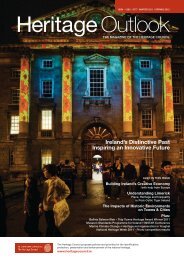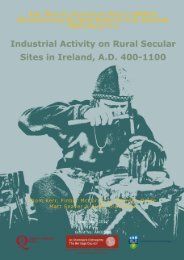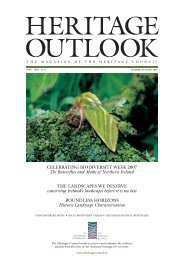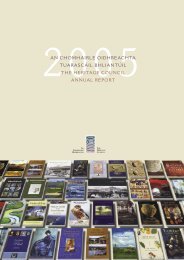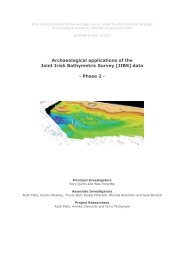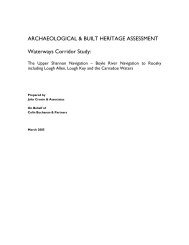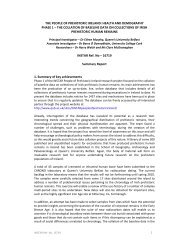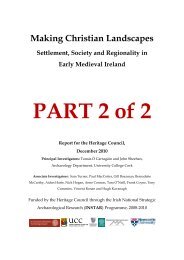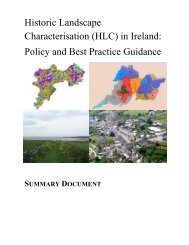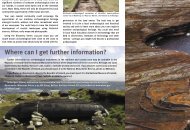The Heritage Council Annual Report 2002
The Heritage Council Annual Report 2002
The Heritage Council Annual Report 2002
You also want an ePaper? Increase the reach of your titles
YUMPU automatically turns print PDFs into web optimized ePapers that Google loves.
4. Local Authorities and <strong>Heritage</strong><br />
Management<br />
<strong>The</strong> <strong>Heritage</strong> Officer Programme<br />
County <strong>Heritage</strong> Officers are employed by Local Authorities in partnership with the<br />
<strong>Heritage</strong> <strong>Council</strong> through the <strong>Heritage</strong> Officer Programme. <strong>The</strong> Programme has<br />
developed from an initial intake of three County <strong>Heritage</strong> Officers in 1999 to<br />
seventeen officers at the end of <strong>2002</strong> with further appointments pending.<br />
<strong>The</strong> success of the programme is illustrated through its continuing expansion and by<br />
the posts being filled on a permanent basis in several authorities. Under the provisions<br />
of the Government’s National <strong>Heritage</strong> Plan each local authority should employ a<br />
heritage officer. <strong>The</strong> <strong>Heritage</strong> <strong>Council</strong> and Local Authorities acknowledge the<br />
propriety of employing <strong>Heritage</strong> Officers and consider the only obstacle to be<br />
financial.<br />
<strong>Heritage</strong> Officers manage the heritage function within a county in a strategic and coordinated<br />
manner. <strong>The</strong>y adopt an integrated approach to heritage, which envelopes all<br />
aspects of heritage within the overall heritage service. <strong>The</strong>y aim to promote enhanced<br />
levels of understanding, conservation and preservation by improving the status and<br />
perception of heritage in their local area. <strong>Heritage</strong> objectives are identified and<br />
prioritised in Local <strong>Heritage</strong> Plans that are formally adopted by Local Authorities.<br />
<strong>The</strong> <strong>Heritage</strong> Officer Function is determined in co-operation and consultation with<br />
individual local authority preferences. Some of the principal areas addressed by<br />
<strong>Heritage</strong> Officers include:<br />
• Local <strong>Heritage</strong> Plans<br />
• Advice and Information for Local Authority Staff<br />
• <strong>Heritage</strong> Appraisal of Development Plans<br />
• Data Collection<br />
• Liaison<br />
• Public Relations<br />
• Public Consultations<br />
• Strategies, Policies and Projects<br />
• Promoting pride and raising awareness in heritage<br />
<strong>The</strong> <strong>Heritage</strong> <strong>Council</strong> provides comprehensive training and networking opportunities<br />
for <strong>Heritage</strong> Officers through the <strong>Heritage</strong> Training and Development Programme.<br />
<strong>The</strong> HTDP is an essential support for <strong>Heritage</strong> Officers considering that <strong>Heritage</strong><br />
Officers have to date been stand-alone operators within their local authority. It is also<br />
a major element in the incentive package for local authorities.<br />
Local Authority <strong>Heritage</strong> Officers <strong>2002</strong>



